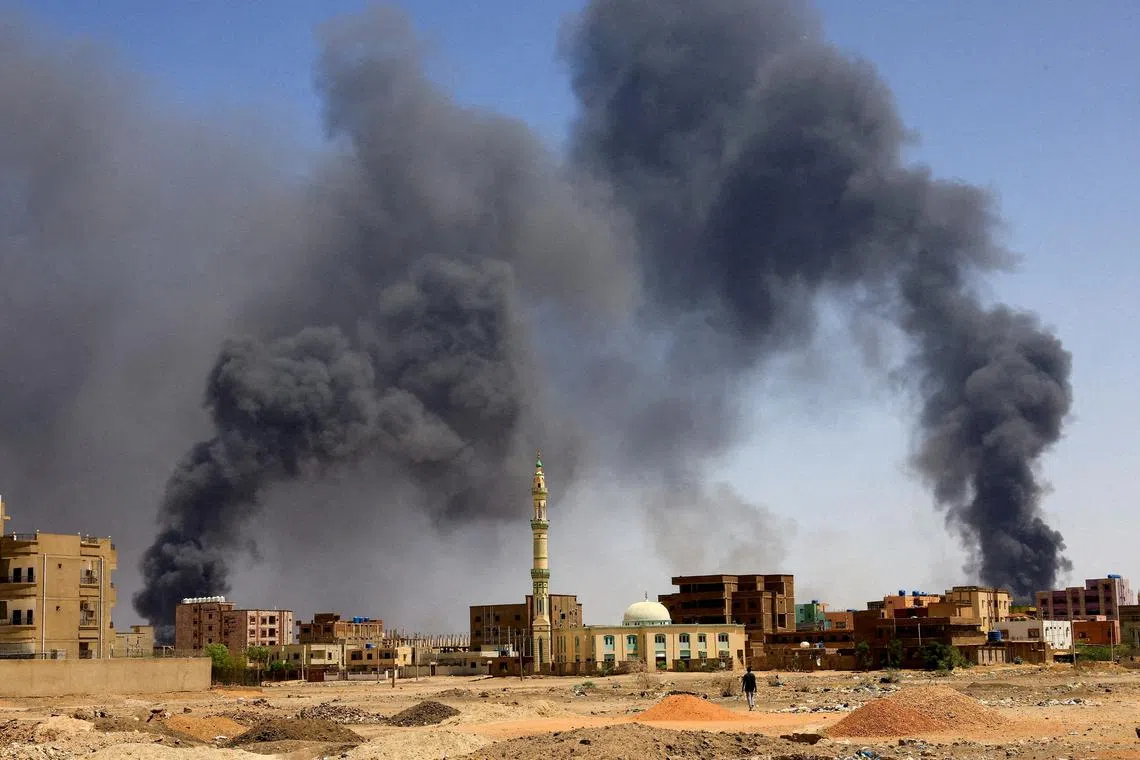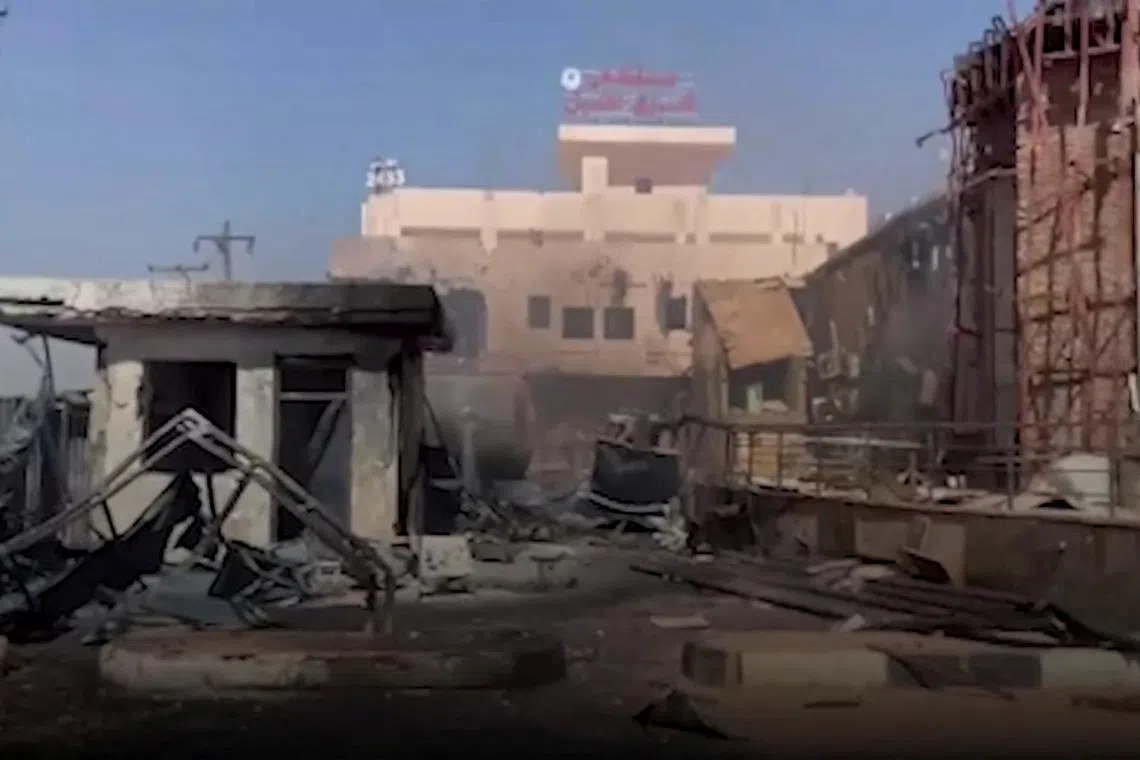US says ready to resume Sudan mediation once parties ‘serious’
Sign up now: Get ST's newsletters delivered to your inbox

Despite repeated pledges from both sides, fighting has flared this week both in greater Khartoum and in the western region of Darfur.
PHOTO: REUTERS
OSLO - The United States said on Thursday that it remained ready to mediate between Sudan’s warring parties but that they needed to be serious about a truce, after the army left talks in Saudi Arabia.
“Once the forces make clear by their actions that they are serious about complying with the ceasefire, the United States and the Kingdom of Saudi Arabia are prepared to resume facilitation of the suspended discussions to find a negotiated solution to this conflict,” a US State Department spokesman said, as US Secretary of State Antony Blinken visited Oslo.
Sudan’s army on Wednesday blasted bases of the paramilitary force after pulling out of the ceasefire talks, accusing its rival of violating the truce meant to bring in aid.
Sudanese army forces blasted paramilitary bases with artillery in Khartoum on Wednesday after pulling out of US and Saudi-brokered ceasefire talks,
The State Department spokesman said there had been “serious violations of the ceasefire by both sides” in the conflict.
“These violations have led us as a facilitator of these talks to seriously question whether the parties are ready to take the actions needed to meet the obligations they have undertaken on behalf of the Sudanese people,” he said.
Mediators have blamed both sides for violating the truce, which was supposed to enable secure corridors for delivering aid to an increasingly needy population.
In both the north and south of the capital, key bases of commander Mohamed Hamdan Daglo’s Rapid Support Forces came under attack by troops loyal to army chief Abdel Fattah al-Burhan, residents told AFP.
One witness said there was “heavy artillery fire from army camps” in northern Khartoum, on the 47th day of a war that researchers said has claimed 1,800 lives.
Another reported “artillery blasts on the Rapid Support Forces (RSF) camp in al-Salha” in southern Khartoum – the largest paramilitary base and arsenal in the city.
The attacks came two days after United States and Saudi mediators said the warring parties had agreed to extend by five days the initial week-long humanitarian truce.
The mediators of the talks, held in the Saudi city of Jeddah, acknowledged repeated breaches but have held off imposing any sanctions.
‘Fight until victory’
The army walked out “because the rebels have never implemented a single one of the provisions of a short-term ceasefire, which required their withdrawal from hospitals and residential buildings”, a Sudanese government official said on condition of anonymity because he was not authorised to speak to the press.
Mediators admitted the truce had been “imperfectly observed”, but said the extension would “permit further humanitarian efforts”.
Despite repeated pledges from both sides, fighting has flared this week both in greater Khartoum and in the western region of Darfur.
“The army is ready to fight until victory,” General Burhan declared during a visit to troops in the capital.
The RSF, led by Gen Burhan’s deputy-turned-foe Daglo, said they would “exercise their right to defend themselves” and accused the army of violating the truce.
Sudan specialist Aly Verjee said the mediators had been eager to avoid a complete breakdown of the talks, for fear of a major escalation on the ground.
“The mediators know that the situation is bad”, but were hoping for “arrangements that are better respected”, Mr Verjee, a researcher at Sweden’s University of Gothenburg, said before the army’s withdrawal from the talks.
Snipers, air strikes
On Sunday the mediators said both forces had disrupted humanitarian efforts, including through the presence of snipers near hospitals in RSF-controlled territory, and army “elements” stealing medical supplies.
They said RSF occupied “civilian homes, private businesses, and public buildings”, some of which were looted, while Gen Burhan’s forces flew military aircraft daily during the ceasefire, “including a confirmed airstrike” that reportedly killed two people.
African Union spokesman Mohamed El Hacen Lebatt told AFP that suspension of the talks should “not discourage” mediation efforts.
United Nations Secretary-General Antonio Guterres on Wednesday reiterated his support for the body’s envoy to Sudan, Mr Volker Perthes, after Gen Burhan called for his dismissal.
“It is up to the Security Council to decide whether the Security Council supports the continuation of the Mission for another period or whether the Security Council decides that it is time to end it,” he added.
After a meeting with East African bloc IGAD, and other officials, he said a plan for broad talks among all Sudanese would be proposed as soon as possible.
Since fighting erupted on April 15,

The damaged East Nile Hospital in Khartoum, Sudan, on May 15, 2023. Three-quarters of hospitals in combat zones are not functioning.
PHOTO: REUTERS
The UN says 1.2 million people have been internally displaced and more than 425,000 have fled to neighbouring countries.
Ms Yaqout Abderrahim escaped Khartoum for Port Sudan, where she has been waiting 15 days for a rare seat on a flight out.
“We want to leave at any price because our houses are destroyed and we no longer have any means to raise our children,” she told AFP among families camped out on the ground.
More than half the population – 25 million people – are now in need of aid and protection, the UN says.
Entire districts of Khartoum no longer have running water, electricity is only available for a few hours a week, and three quarters of hospitals in combat zones are not functioning.
The Health Ministry said on Wednesday that “nine health facilities” had gone out of service in Jazira state, just south of Khartoum, “despite the declared truce”.
It blamed “the presence of RSF militias threatening the movement of medical personnel and supplies”.
Hundreds have been killed in Darfur, on Sudan’s western border with Chad, where continued fighting “blatantly disregards ceasefire commitments”, Mr Toby Harward, of the UN refugee agency, said earlier.
Darfur has never recovered from the years-long war that began in 2003 when a rebel uprising led strongman Omar al-Bashir to unleash the Janjaweed militia, from which the RSF are descended.
Experts say Gen Burhan is facing increasing pressure from his own Islamist supporters and remnants of the Bashir regime, with whom he had built a symbiotic relationship in order to gain power. AFP


